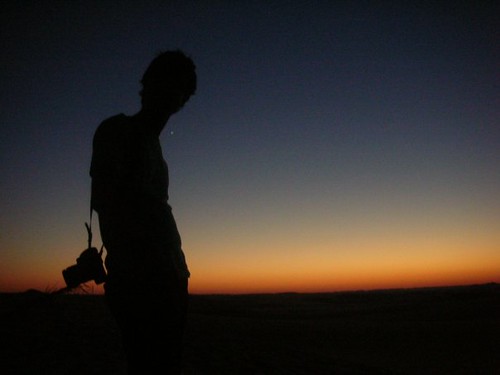Who throws a shoe?
At whom is a shoe thrown?
At whom is a shoe thrown?
Three days later, the shoe-throwing incident is still big news in Egypt.
It seems that American coverage of the event has focused primarily on two aspects.
First, there has been the talk of how Muntader al-Zaidi has become a "folk hero" in the Middle East, inspiring rallies in Iraq, and general admiration from Arabs everywhere.
Second, there is the attempt to impress upon the American public the cultural significance of throwing shoes – how this is more than just Austin Powers slapstick comedy – but a grave insult.
But both of these components, while important, seem to miss the broader significance of the event from a Middle Eastern perspective… namely that it somehow symbolically undermines a perception of American credibility, that it intangibly pierces the 4th wall of American hegemony…
I like to do a grammar exercise with my Advanced English classes where we look at a list of Bushisms and attempt to fix the grammar and usage mistakes. It’s a fun exercise, but the initial reaction from students is inevitably one of disbelief; not only that the American President could have a weaker grasp on the English Language than they do, but also that such a compilation of quotes even exists… that the President of The United States would stray from a carefully orchestrated image enough to say such things, and then that these comments would be publicly viewable – and open to public ridicule.
That kind of thing just doesn’t happen here. This is a country where it’s illegal even to speculate on the legal succession of the 80 year old president. Where the biggest scandal of the year – involving a millionaire murdering a famous singer – is banned from state broadcasting.
It’s not so much that it’s unimaginable that someone would throw a shoe at Mubarak: its unimaginable that Mubarak would have a shoe thrown at him. This is not something that happens to a President. This is not something that happens to people with power.
As much as Egyptians might hate the United States government, there is still a firm appreciation that it is the Government, a separate entity detached from the mistakes and embarrassments that might affect the citizenry. Indeed the general warmth shown to regular Americans here is entirely predicated on the notion that, just as their government is completely separate from what they deem humanly Egyptian, so is ours.
I’m trying to decide how obvious of an observation this is… back home we take for granted that Bush is a Lame Duck, a laughable goofball who's days are numbered. The Middle East, still swarming with US troops, doesn't exactly have the luxury to appreciate this viewpoint.
All this is also directly tied to an alternate understanding of Respect in the Middle East. For better or worse, in America humor is an acceptable - and often effective – way to diffuse potentially embarrassing or disrespectful situations. One’s ability to laugh something off, to show that it has not affected him, is seen as a sign of strength. Indeed, humor seems to be the general response from Americans. Yet as I’ve learned the hard way, this doesn’t really fly in Egypt. I won’t go so far as to say that authority is all that Egyptians understand – an idea that strikes of Barbarism, but I will say that in most cases, a perception of toughness is a prerequisite for respect.
But personally, I’m surprised the coverage hasn’t focused more on the Presidents reflexes... he dodged that shoe fast.


No comments:
Post a Comment